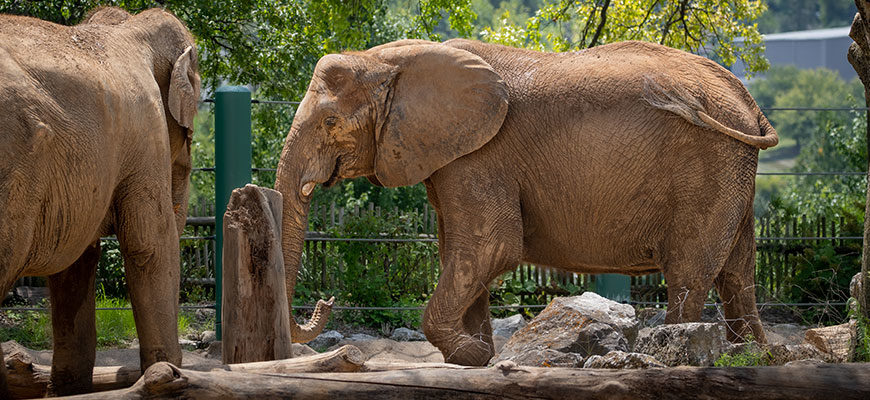Hi, Zoo friends!
You may have seen the recent news about an organization that is calling on individuals to reach out to the Louisville Zoo and request that we rehome our elephants to a sanctuary. Although these accusations are built on false claims that our facilities are ill-equipped to house our beloved elephants, we are welcoming the discussion and viewing it as an opportunity to shine a light on Mikki, Punch, and Fitz’s home. Below are some facts about our elephant program and the plight of elephants in the remnant wild:
FACT: In 2016, the Louisville Zoo doubled the elephant exhibit space to 24,084 square feet, providing a larger space for our elephants to live in and thrive.
FACT: The real cause for alarm is that 96 elephants are killed every day in Africa. If this continues, African elephants could be extinct in the wild within the next 20 years. Some predictions have Asian elephants disappearing within three generations. The Louisville Zoo is helping create change and investing in the future of elephants by bringing new elephants into the world, with the help of the Association of Zoos and Aquariums (AZA).
FACT: The Wildlife Conservation Society’s (WCS) 96 Elephants campaign has helped to make progress with legislation to save this precious species. The Louisville Zoo was one of the first to get on board with this vital animal protection movement.
FACT: Our elephants Mikki and Punch have been together at the Zoo for over 30 years and they have bonded as a herd. Keeping them together is what is best for these two specific elephants but also for the AZA-managed population in North American zoos.
FACT: One of the most natural things for a female elephant is to give birth and raise a calf. Our breeding program is not only for the betterment of our specific elephant herd but also for the species at large. Elephants are social animals and our breeding attempts are intended to grow the social herd and continue to support their behavioral health.
FACT: We were in accordance with the AZA management standards during this process. We went a step further and took daily blood samples to monitor Mikki’s cortisol (the stress hormone). Over four years and 15 artificial insemination procedures, the data showed no change in cortisol on a day with an artificial insemination procedure or a day without. What does this mean? The procedure did not cause stress to Mikki. And with the decline of elephants, Fitz is adding to conservation efforts to save the elephants.
We want to make sure you are aware of the false allegations against us and allow you the opportunity to hear the truth from us. As an accredited facility, we are proud of our program. It is critical to the conservation needs of animals in the remnant wild that people in urban areas have the opportunity to visit zoos. This helps with awareness for these endangered animals and our mission to save these species.
Let’s all use this opportunity to talk about what is important to conservation efforts – saving our elephants before they go extinct.
Nobody loves or cares for elephants more than we do! Combine that love of elephants with the science of elephant welfare and the expertise of elephant care professionals, and we know we have everything we need to make sure the elephants have everything they need.

